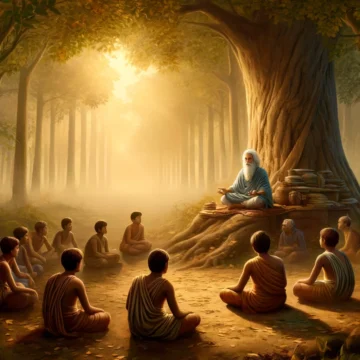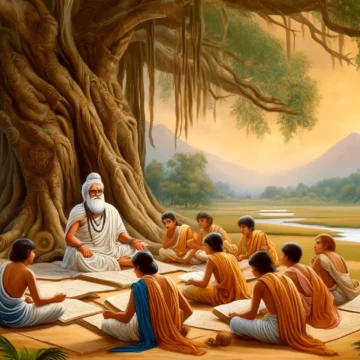Exploring the Manusmriti's intricate system of varna determination, this blog delves into how societal roles were influenced by personal qualities, scholarly achievements, and ethical conduct. The roles of the Acharya, the importance of Vedic education, and the dynamic varna system reveal a society valuing merit and duty.
Tag: Vedic education
Manusmriti Educational Guidelines: Ancient Vedic Wisdom for Modern Learning
Explore how the Manusmriti's ancient educational guidelines blend discipline, morality, and adaptability to enhance modern learning environments. This series delves into the rich Vedic traditions, illuminating their relevance in today's fast-paced educational settings, emphasizing a holistic approach that integrates intellectual growth with spiritual and ethical development.
Indian Education System and Its Legacy
The Indian education system has evolved from its ancient Vedic roots, where knowledge was imparted orally, emphasizing spiritual and ethical values. During the colonial era, British policies reshaped traditional frameworks, suppressing indigenous knowledge. Post-independence, India struggled with these legacies but aimed to realign its education system. Today, initiatives like the New Education Policy integrate modern innovations with India's diverse cultural heritage, promoting inclusivity and holistic education.
Gurukul Education System: A Journey Through Time
The Gurukul Education System, deeply rooted in Hindu culture, has profoundly shaped the intellectual and spiritual landscape of India from the Vedic period to the present day. Gurukuls, traditional residential schools, offered more than just academic knowledge; they were centers of holistic learning where students received physical training, moral discipline, and spiritual enlightenment under the close guidance of a Guru. This system promoted an egalitarian approach to education, where learning was accessible to all based on merit rather than social standing, exemplified by the legendary camaraderie and schooling of Lord Krishna and Sudama. The curriculum was comprehensive, incorporating Vedic studies, mathematics, astronomy, philosophy, and the arts, ensuring a well-rounded development of students. Despite the shifts brought about by colonial influences, the legacy of Gurukul education continues to resonate in modern educational practices, emphasizing the importance of holistic development and moral values.





